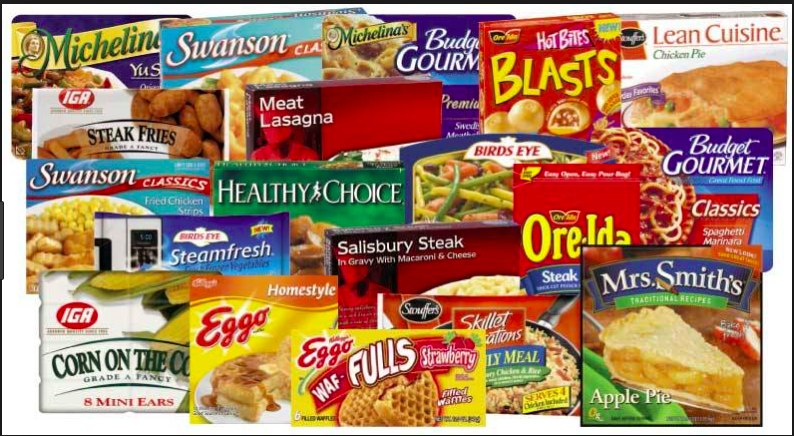A brand new study just published by Kevin Hall and Colleagues has set out to discover whether a diet of ultra-processed foods affect energy intake in 20 weight stable adults.
First of all, lets back up slightly and define what exactly an ultra-processed food is: -
“formulations mostly of cheap industrial sources of dietary energy and nutrients plus additives, using a series of processes” (Monteiro et al, 2018)
They are inexpensive, have long shelf-life, are relatively safe from the microbiological perspective, provide important nutrients, and are highly convenient – often being either ready-to-eat or ready-to heat.
Examples of ultra-processed foods
Ultra-processed foods have become increasingly common worldwide and now constitute the majority of calories consumed in America.
It has been postulated that ultra-processed foods are contributing to the obesity epidemic via various mechanisms, including: -
They are typically high in calories, sugar, salt and fat
Have been theorised to disrupt gut-brain signalling which may influence intake of these foods independent of palatability or energy density of the food
So, the purpose of this study was to examine whether there is a causal relationship between ultra-processed food consumption and obesity.
They admitted 10 male and 10 female weight stable adults were randomly assigned to either the ultra-processed or unprocessed diet for 2 weeks at which point they crossed over to the other diet for two weeks.
The study design above, with both groups participating in 2 weeks of ultra-processed and 2 weeks unprocessed diets.
During each diet arm, participants were offered 3 daily meals and they were instructed to eat as much or as little of them as they wanted. Menus were designed to be matched for total calories, energy density, macronutrients, fibre, sugar, and sodium, but differed in the percentage of calories coming from ultra-processed sources.
And the results?
Participants on the diet of ultra-processed foods consumed a whopping 508 calories more per day than those eating the unprocessed diet.
Results from the study highlighting the extra energy intake consumed on the ultra-processed diet
Not surprisingly, consumption of the ultra-processed diet led to weight gain (1.7lbs in just 2 weeks).
So, why the increased intake on the ultra-processed diet?
Well, it turns it out wasn't because the participants rated the food any more pleasant or familiar than the unprocessed.
However, 2 main reasons can be put forward: -
Eating speed was faster when consuming the diet of ultra-processed foods. Previous studies have demonstrated that higher eating rates can result in increased overall energy intake
The protein leverage hypothesis, which suggests our bodies attempt to maintain a constant protein intake, and so people consuming less protein from ultra-processed foods may be eating more of them to try to maintain some predetermined physiologically-desired/governed protein intake
To Conclude:
Our data suggest that eliminating ultra-processed foods from the diet decreases energy intake and results in weight loss whereas large quantities of ultra-processed food in the diet increases energy intake and leads to weight gain….. limiting consumption of ultra-processed foods may be an effective strategy for obesity prevention and treatment. (Hall et al, 2019)
So, how might we go about eliminating ultra-processed foods from our diet? Youni Freedhoff suggests the following: -
Improved school foods and school food policies that reduce ultra-processed offerings
Bolstering the case for bringing back home economics
Furthering the calls to ban junk food marketing to children (and adults)
Changing food culture such that ultra-processed foods aren't the cornerstone of every event no matter how small
Pushing ultra-processed junk food out of sport and sport sponsorship
Putting an end to ultra-processed junk food fund raising
Institutional and corporate cafeterias' offerings' reforms
Strengthening front of package labeling reforms by perhaps not permitting front of package claims on ultra-processed foods (or adding warnings)
A greater focus on whole foods that are minimally processed should be the bed-rock of any diet, no matter the slant (high fat, low carb, paleo, ketogenic, intermittent fasting etc). Hopefully this paper will add much greater weight to this stance.
Read the full paper here.
——————————————————————————————————————————————————————
Since you’re here, download my FREE recipe book here - packed full of recipes you can make at home. They are quick, easy and super tasty. And given the study above, it might be wise to start cooking at home rather than buying out!
——————————————————————————————————————————————————————




